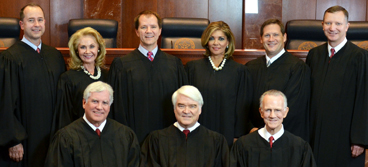© 2016 The Texas Lawbook.
By Janet Elliott
AUSTIN (Oct. 10) – The Texas Supreme Court is revisiting the high-profile issue of when pipelines are common carriers allowed to condemn private property. Once again the dispute involves the Denbury Green Pipeline that transports carbon dioxide through southeast Texas.
As with the initial appeal, the latest case has attracted extensive interest from the oil and gas industry. Energy interests warn about negative effects throughout the industry if Denbury loses again.

The case first roiled the pipeline industry in 2012 when the Supreme Court ruled that Denbury Green Pipeline-Texas LLC did not prove that its CO2 line was a “common carrier” allowed to condemn a Jefferson County rice farmer’s land.
The 2012 opinion said it is not enough for a company to simply register as a common carrier at the Texas Railroad Commission when there is evidence it planned a private pipeline to aid recovery of depleted oil in a field acquired by Plano-based Denbury Resources Inc.
After the 2012 ruling, Denbury told the trial court it had post-construction contracts to transport other companies’ products through its pipeline. Judge Donald Floyd of the 172nd District Court in Jefferson County granted summary judgment, finding Denbury Green to be a common carrier pipeline.
The Ninth Court of Appeals in Beaumont reversed the trial court in 2015, saying that a factual inquiry was needed to assess whether the pipeline meets the test established by the Supreme Court in the initial appeal.
Oral arguments before the court last month centered on whether Denbury had contemplated that other entities would use the pipeline when it first sought to condemn land in 2008. Texas Rice Land Partners Ltd. argued that a trial should be held to determine those facts.

In addition, Yeates said, the Green Pipeline is the only CO2 pipeline in the southeast Texas region, making it reasonable that other industrial plants would use it for their transportation needs.
Reasonable Probability Test
Yeates, a Vinson & Elkins partner, said the pipeline meets the Supreme Court’s test of having a reasonable probability of being used by at least one third-party customer who would retain ownership of their gas or sell it to parties other than the carrier.
William Christian, who represents the rice farmer, said Denbury’s after-the-fact contracts are not what the court should consider. The company should be judged by public statements it made in 2008 that the pipeline was planned to bring carbon dioxide from the Jackson Dome to Denbury’s recently acquired Hastings Field south of Houston, he said.
“Those statements create at least a fact issue at the time they were condemning my client’s property,” said Christian. “The intent is not what is in the mind of the company, but what is in their public statements.”
Christian, a shareholder in Austin’s Graves, Dougherty, Hearon & Moody, said summary judgment is available to those pipeline companies with early stage descriptions of intentions and plans that meet the reasonable probability test. For example, he said TransCanada recently prevailed in the Texarkana Court of Appeals in an eminent domain dispute over the Keystone Pipeline.
Carbon sequestration may benefit the public interest, Christian said, but Congress has not given authority to condemn land for such projects. “They are trying to fit a square peg into a round hole,” he said.
Under questioning from Justice Jeff Boyd, Christian admitted that the ultimate remedy if landowners prevail could involve digging up the pipeline and returning money paid for the easements.
Because pipeline companies are allowed to proceed with projects while eminent domain disputes work their way through the courts, Yeates said it is important for the Supreme Court to address the relevance of later contracts for use of completed pipelines.
“They can’t spend money to build pipelines if they are going to be subjected to jury trials down the road on whether they’re a common carrier all up and down the pipeline,” she said.
“What is going to happen? The landowners are going to demand extortionist amounts of money to keep that pipeline in the ground.”
Industry, Landowners Warn of Consequences
Energy Transfer Partners General Counsel Jim Wright was among those urging the Supreme Court to overturn the court of appeals.
“The Beaumont Court of Appeals’ conversion of [the Supreme Court’s] objective test into a subjective test, requiring a jury trial on right-to-take issues in many pipeline survey access or condemnation actions, and ignoring of evidence generated after a pipeline is first proposed, is wreaking havoc and will continue to wreak havoc on the pipeline business, with negative ripple effects to oil and gas producing and refining business,” Wright said.
Barron & Adler, an Austin law firm that represents landowners, said in an amicus brief that the private property rights of Texas citizens are equally, and perhaps more, significant.
“Amici does not suggest that pipeline projects cease or even that they be substantially delayed, but rather suggests a scenario in which the landowner simply has the right to seek judicial review of the purported common carrier status of a pipeline before the landowner’s property is forcibly taken and permanently altered,” said the law firm.
To read an article about the 2012 ruling, see Supreme Court Says Pipeline Companies Must Prove Status to Tap Eminent Domain.
© 2016 The Texas Lawbook. Content of The Texas Lawbook is controlled and protected by specific licensing agreements with our subscribers and under federal copyright laws. Any distribution of this content without the consent of The Texas Lawbook is prohibited.
If you see any inaccuracy in any article in The Texas Lawbook, please contact us. Our goal is content that is 100% true and accurate. Thank you.
